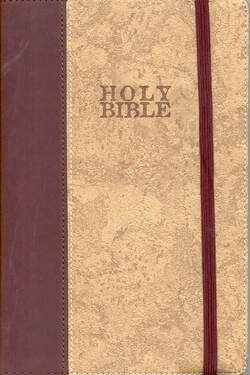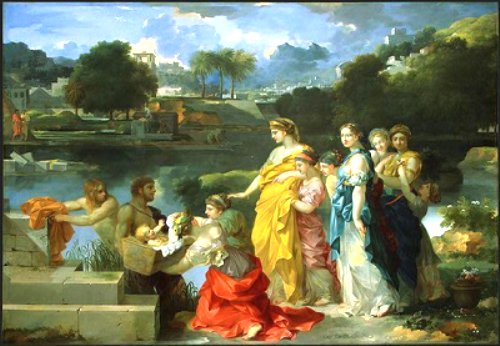Hebrews 3:1-6 Lesson 417
Read both the "King James Bible" and the "New Living Translation."
In this lesson:
In lesson 416, we learned that Jesus is greater than the angels in heaven.
Now Jews learn that Jesus is greater than their icon, Moses (3:1-5).
Believers are God's house (3:6).
"Many Jewish Christians, in their infantile state (Hebrews 5:11-13), had not yet fully learned the relation of Christ to Moses. It seems that they still thought of Moses as the Law-Giver, and of Christ as an executive to enforce the Law of Moses on all other nations: Moses first, Christ under him. But they had it just backward. Christ is as far above Moses, as the heir and owner of a house is above the servants in the house."
("Halley's Bible Handbook" by Henry H. Halley, Zondervan Publishing House, Grand Rapids, Michigan; page 649)
Pharaoh's daughter finds baby Moses (circa 1650).
By the French painter and engraver Sebastien Bourdon (1616-1671).
By the French painter and engraver Sebastien Bourdon (1616-1671).
Who was Moses -
Moses was a prophet of Israel (Deuteronomy 34:10), the author of the first five books in the Old Testament (the Pentateuch), a revered Jewish leader and icon who, with God's help, led an estimated 3,000,000 Israelites out of Egyptian bondage to form the Jewish nation. The son of Amram and Jochebed (Exodus 6:20), Moses was born a Levite Jew (Exodus 2:1) in 1571 BC when the Israelites were enslaved in Egypt (Exodus 1:13-14). Afraid that the growing population of Jewish slaves would someday turn against their Egyptian masters (Exodus 1:10), Pharaoh Rameses ordered midwives to kill all male Jewish babies at birth (Exodus 1:15-16). When the midwives refused (Exodus 1:17), Pharaoh ordered all male babies to be "cast into the river" (Exodus 1:22). To save the infant Moses' life, his mother Jochebed hid him in a basket in the reeds on the banks of the Nile River (Exodus 2:3). Pharaoh's daughter found Moses (Exodus 2:5-6) and raised him as her son. Growing up, he received an education (Acts 7:22) and all the advantages given to the son of a king. But at the age of forty, Moses killed an Egyptian for mistreating a Hebrew (Exodus 2:11-12; Acts 7:23-24) and was forced to flee Egypt. Moses fled to Midian (Exodus 2:15) near Sinai, where he married and lived the simple life of a Shepard (Exodus 3:1) for forty years until God appeared to him in the form of a burning bush (Exodus 3:1-22; Acts 7:30-34). Following God's instructions, the eighty-year-old Moses returned to Egypt to liberate the Israelites. After God brought a series of ten miracles/plagues down on the Egyptians (Exodus 7:1-12:51), Pharaoh allowed the enslaved Israelites to leave Egypt a free people. The Israelites wandered through the wilderness for the next forty years, searching for the Promised Land (Canaan). Moses, "the mediator of the old covenant," received the Mosaic Law (the First Covenant, the Ten Commandments) from God on Mount Sinai (Exodus 34:1-35), prophesied the coming of the Messiah (John 5:46; Acts 7:37), was likened to Christ (Deuteronomy 18:15; Acts 7:37), and appeared with Jesus during the transfiguration (Matthew 17:3-5; Mark 9:2-4; Luke 9:29-30). Moses lived to be one hundred and twenty years old (forty years in the royal palace, forty years as a fugitive in Midian, and forty years in the wilderness) and died on Mount Nebo in Moab (eight miles east of the mouth of the Jordan River). In Jude 1:9, we see Satan arguing with Michael the Archangel over Moses' body. Satan lost the argument and God buried Moses (Deuteronomy 34:5-7). The story of Moses can be found in Exodus, Leviticus, Numbers, and Deuteronomy.
Moses was a prophet of Israel (Deuteronomy 34:10), the author of the first five books in the Old Testament (the Pentateuch), a revered Jewish leader and icon who, with God's help, led an estimated 3,000,000 Israelites out of Egyptian bondage to form the Jewish nation. The son of Amram and Jochebed (Exodus 6:20), Moses was born a Levite Jew (Exodus 2:1) in 1571 BC when the Israelites were enslaved in Egypt (Exodus 1:13-14). Afraid that the growing population of Jewish slaves would someday turn against their Egyptian masters (Exodus 1:10), Pharaoh Rameses ordered midwives to kill all male Jewish babies at birth (Exodus 1:15-16). When the midwives refused (Exodus 1:17), Pharaoh ordered all male babies to be "cast into the river" (Exodus 1:22). To save the infant Moses' life, his mother Jochebed hid him in a basket in the reeds on the banks of the Nile River (Exodus 2:3). Pharaoh's daughter found Moses (Exodus 2:5-6) and raised him as her son. Growing up, he received an education (Acts 7:22) and all the advantages given to the son of a king. But at the age of forty, Moses killed an Egyptian for mistreating a Hebrew (Exodus 2:11-12; Acts 7:23-24) and was forced to flee Egypt. Moses fled to Midian (Exodus 2:15) near Sinai, where he married and lived the simple life of a Shepard (Exodus 3:1) for forty years until God appeared to him in the form of a burning bush (Exodus 3:1-22; Acts 7:30-34). Following God's instructions, the eighty-year-old Moses returned to Egypt to liberate the Israelites. After God brought a series of ten miracles/plagues down on the Egyptians (Exodus 7:1-12:51), Pharaoh allowed the enslaved Israelites to leave Egypt a free people. The Israelites wandered through the wilderness for the next forty years, searching for the Promised Land (Canaan). Moses, "the mediator of the old covenant," received the Mosaic Law (the First Covenant, the Ten Commandments) from God on Mount Sinai (Exodus 34:1-35), prophesied the coming of the Messiah (John 5:46; Acts 7:37), was likened to Christ (Deuteronomy 18:15; Acts 7:37), and appeared with Jesus during the transfiguration (Matthew 17:3-5; Mark 9:2-4; Luke 9:29-30). Moses lived to be one hundred and twenty years old (forty years in the royal palace, forty years as a fugitive in Midian, and forty years in the wilderness) and died on Mount Nebo in Moab (eight miles east of the mouth of the Jordan River). In Jude 1:9, we see Satan arguing with Michael the Archangel over Moses' body. Satan lost the argument and God buried Moses (Deuteronomy 34:5-7). The story of Moses can be found in Exodus, Leviticus, Numbers, and Deuteronomy.
Study Tip:
Take notes.
Notes help us learn and remember.
They keep us organized, focused, and help us follow up on thoughts and ideas.
Take notes.
Notes help us learn and remember.
They keep us organized, focused, and help us follow up on thoughts and ideas.











